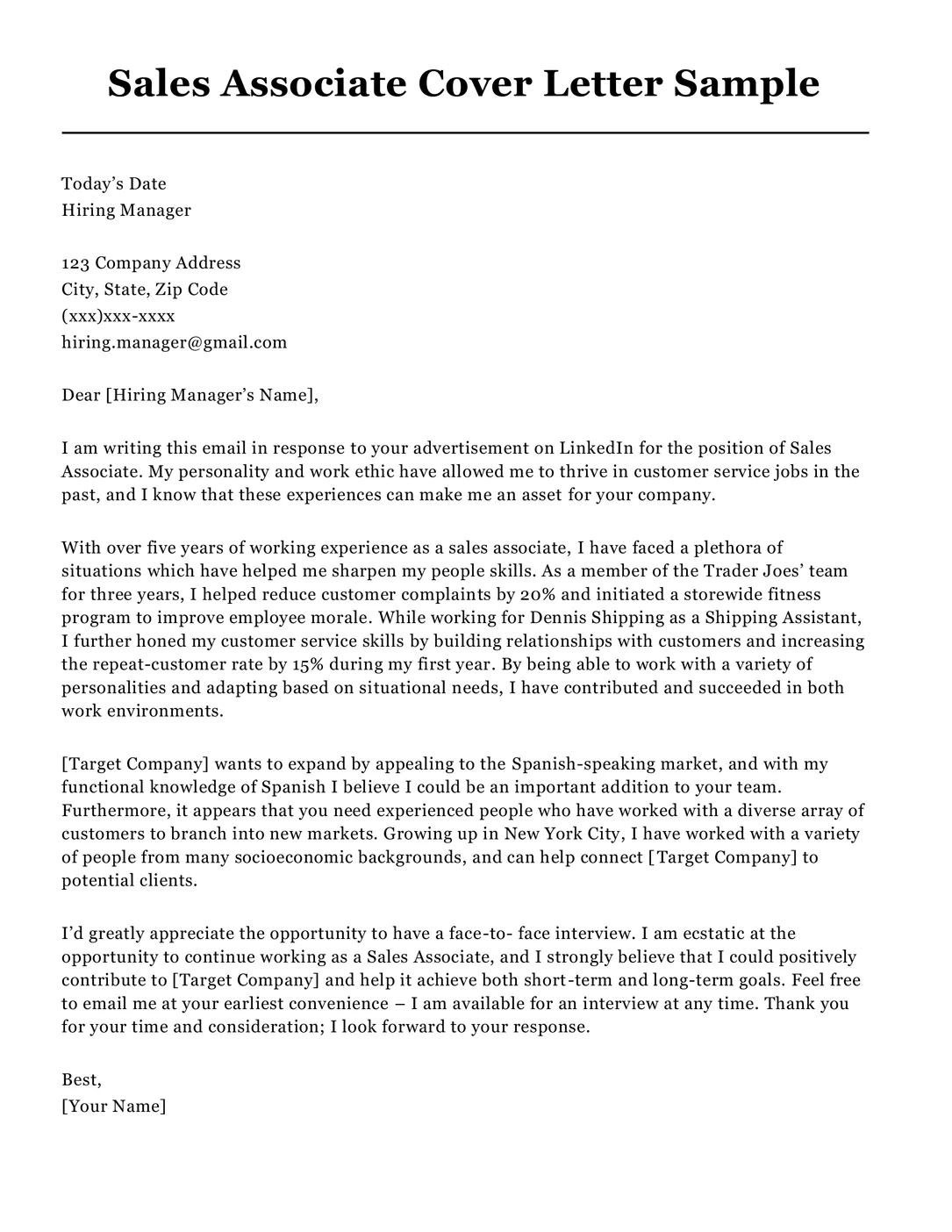Cover Letter Sales Associate Key Elements
A cover letter is your first opportunity to make a strong impression on a potential employer, especially when applying for a Sales Associate position. It’s more than just a formality it’s your chance to showcase your skills, experiences, and enthusiasm in a way that a resume alone cannot. A well-crafted cover letter can significantly increase your chances of getting an interview, setting you apart from other applicants. It should be concise, compelling, and tailored to the specific job you are applying for. The key is to highlight what makes you the best candidate and why you are passionate about the role and the company. Remember, this is your chance to sell yourself, just as you would sell a product or service to a customer.
Highlighting Your Skills
The sales associate role requires a diverse skill set including communication, customer service, and problem-solving. When writing your cover letter, carefully review the job description and identify the key skills the employer is seeking. Then, provide specific examples from your past experiences where you’ve demonstrated these skills. Instead of just listing skills, show how you’ve used them to achieve positive results. For example, instead of saying “I have strong communication skills”, you could write “I effectively communicated with customers to understand their needs, resulting in a 15% increase in customer satisfaction.” This approach brings your skills to life and makes them more impactful. The goal is to paint a picture of how you would contribute to the company’s success.
Quantifying Achievements
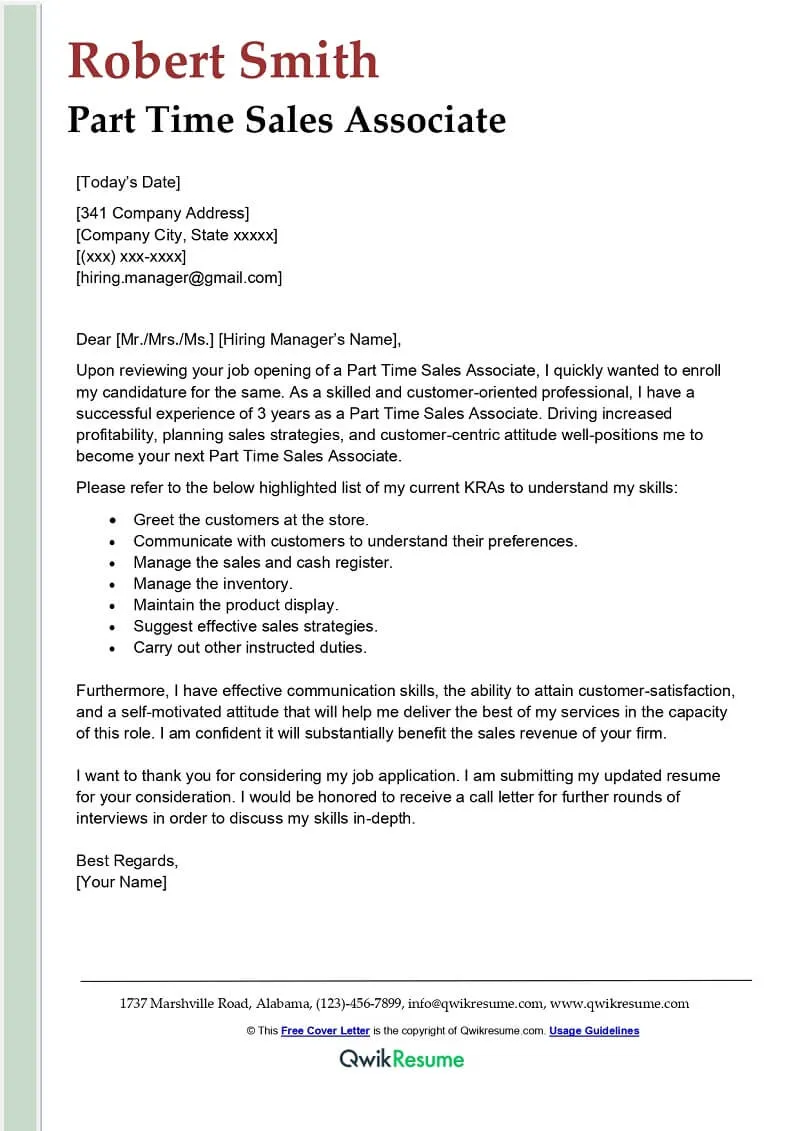
Numbers speak volumes in sales. Wherever possible, quantify your achievements to demonstrate your value. Did you exceed sales targets? Improve customer retention rates? Reduce customer complaints? Include specific numbers and percentages to highlight your accomplishments. For instance, “Increased sales by 20% in Q2 through proactive customer engagement and upselling techniques.” This makes your claims more credible and gives the hiring manager a clear understanding of your capabilities. Think about using metrics like sales volume, customer acquisition rates, or any other relevant data that showcases your impact. If you don’t have direct sales experience, focus on transferable skills and how you have achieved goals in other areas.
Tailoring to the Job Description
Generic cover letters rarely impress. Tailor each cover letter to the specific job and company. Read the job description carefully and identify the key requirements and qualifications. Then, structure your letter to address those requirements directly. Explain how your skills and experiences align with what the employer is looking for. Demonstrate your understanding of the company’s mission and values. Refer to the company’s website, social media, and any relevant news to show that you’ve done your research. Customize your letter to show why you’re a perfect fit for this particular role and this particular company. This shows initiative and genuine interest, making you a more appealing candidate.
Formatting Your Cover Letter
The format of your cover letter is just as important as its content. A well-formatted letter is easy to read and professional in appearance. Pay attention to font choices, margins, and spacing to ensure a clean, organized look. Avoid using overly elaborate fonts or excessive formatting. A simple, professional font like Times New Roman, Arial, or Calibri is usually the best choice. Keep your paragraphs concise and break up large blocks of text with bullet points when necessary. Ensure the letter is properly aligned and that the overall layout is visually appealing and easy to navigate. A well-formatted cover letter shows attention to detail, which is essential in a sales associate role.
Header and Contact Information
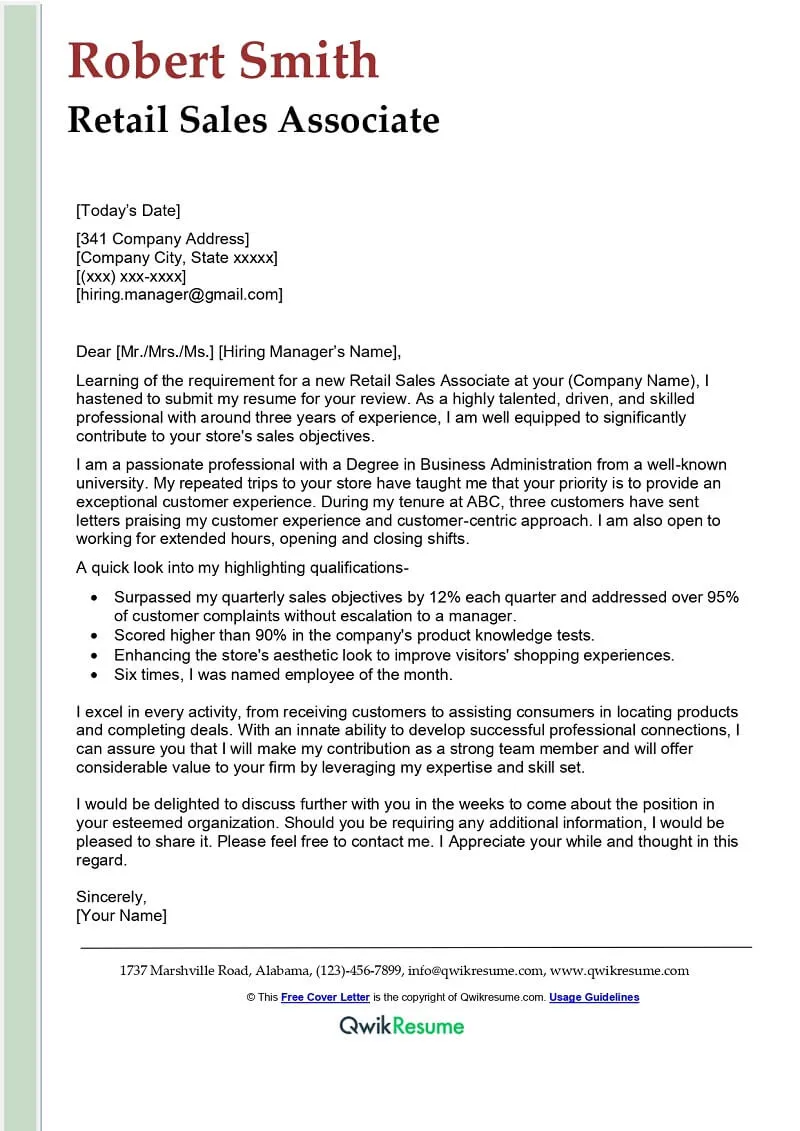
Your header should include your full name, address, phone number, and email address. Ensure the contact information is accurate and up-to-date. Consider using a professional email address that includes your name. Place the header at the top of your letter, either on the left or center-aligned. Following the header, include the date and the hiring manager’s name and title (if known) along with the company’s address. This sets a professional tone and makes it easy for the hiring manager to contact you.
Professional Salutation
Start your letter with a professional salutation. If you know the hiring manager’s name, use it (“Dear Mr. / Ms. [Last Name]”). If you don’t know the name, use a general salutation such as “Dear Hiring Manager” or “Dear [Company Name] Hiring Team”. Avoid using overly casual greetings like “Hi”. A professional salutation shows respect and sets a positive tone for the rest of your letter. This is your first interaction, so ensure it is polite and respectful.
Body Paragraph Structure
The body of your cover letter should be structured into a few well-defined paragraphs. Start with an introduction that states the position you are applying for and how you learned about it. Follow this with paragraphs that highlight your key skills and experiences, providing specific examples and quantifying your achievements. Each paragraph should focus on a different aspect of your qualifications and demonstrate how you meet the job requirements. Use strong action verbs and focus on results. Conclude with a strong closing paragraph that reiterates your interest and expresses your enthusiasm for the opportunity.
Closing the Letter
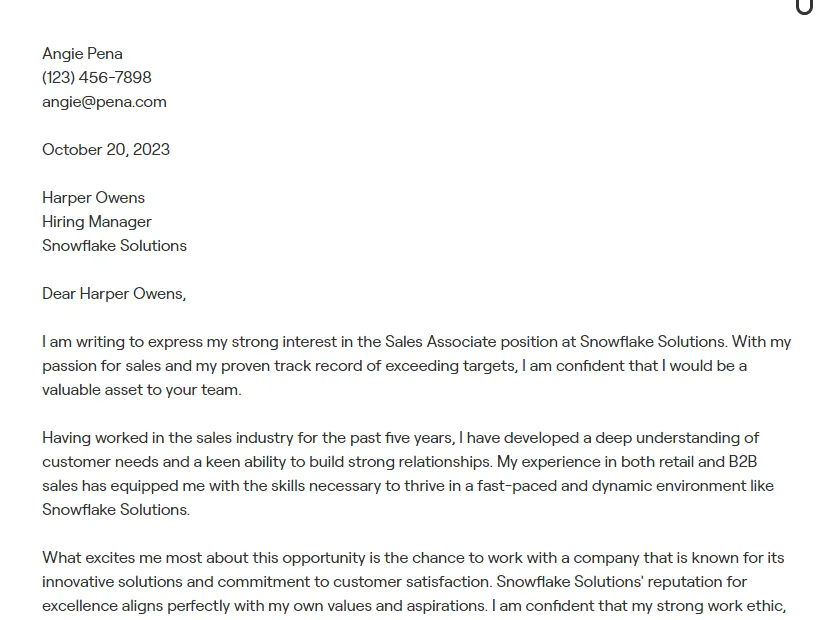
End your cover letter with a professional closing and a call to action. Use a closing such as “Sincerely,” “Respectfully,” or “Best regards.” Below your closing, type your full name and, if submitting a physical copy, leave space for your signature. Reiterate your interest in the position and express your willingness to discuss your qualifications further in an interview. Thank the hiring manager for their time and consideration. A strong closing leaves a positive and lasting impression, encouraging the hiring manager to take the next step.
Showcasing Sales Experience
Your cover letter is an excellent opportunity to showcase your sales experience, especially when applying for a Sales Associate role. Focus on your past successes and how you have contributed to sales growth, customer satisfaction, or other relevant metrics. Include specific examples of your sales techniques, such as upselling, cross-selling, or building rapport with customers. Provide details about the products or services you have sold, the target audience you served, and any special achievements or awards you have received. Showing your sales experience directly translates to your ability to perform in the role.
Describing Sales Achievements
Highlight your sales achievements with compelling details. Avoid generic statements and instead, use specific examples that demonstrate your impact. For instance, instead of stating “Achieved sales targets”, write “Consistently exceeded sales targets by an average of 15% each quarter through effective lead generation and client relationship management.” Quantify your achievements whenever possible. Did you increase revenue, acquire new customers, or improve customer retention? Use percentages, numbers, and specific data to make your claims more credible and persuasive. This allows the hiring manager to understand the concrete results of your work.
Using Action Verbs
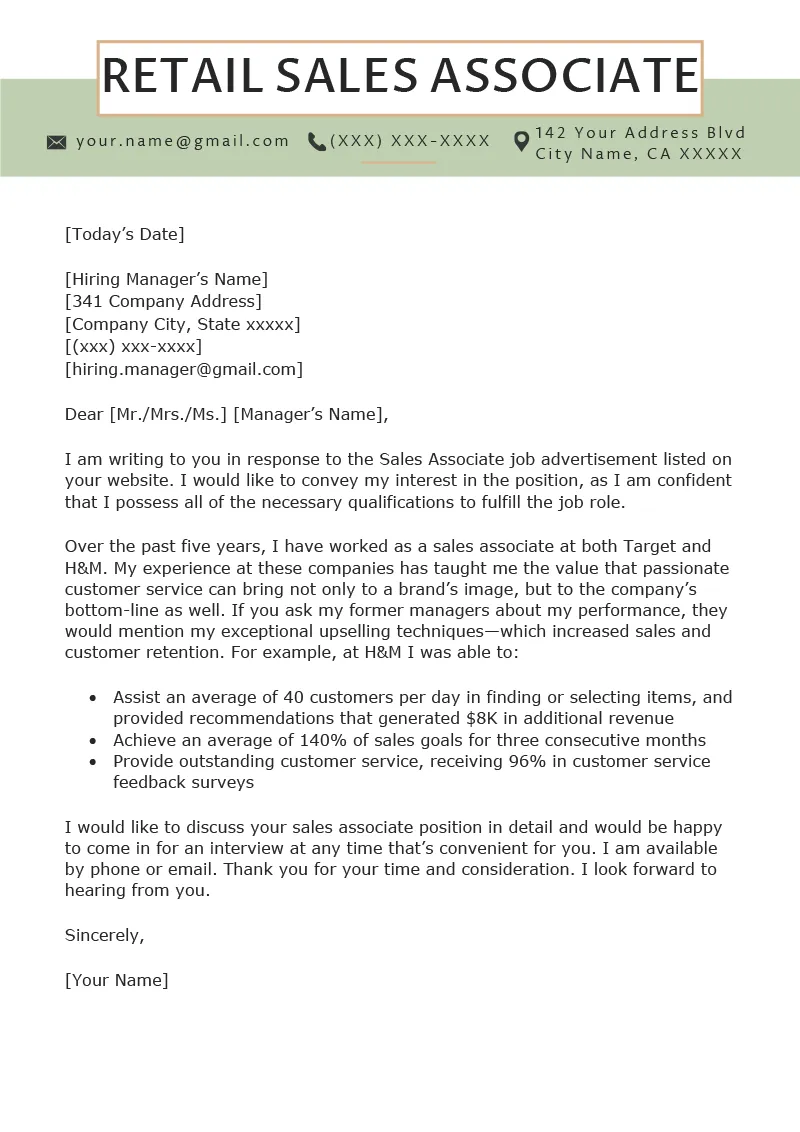
Action verbs make your cover letter more dynamic and engaging. Start your sentences with strong action verbs to describe your accomplishments and skills. Examples include “achieved”, “managed”, “exceeded”, “developed”, “implemented”, “persuaded”, “negotiated”, “trained”, “increased”, and “improved”. Using action verbs makes your cover letter more compelling and demonstrates that you are proactive and results-oriented. By using strong verbs, you create a more vivid and memorable picture of your capabilities and make your cover letter more effective.
Addressing Potential Employers
Addressing your potential employer requires research and a thoughtful approach. The goal is to show that you are genuinely interested in the company and the specific role. Personalize your letter to reflect your understanding of their business, values, and goals. This demonstrates initiative, research, and genuine interest, all of which are valuable qualities in a sales associate.
Researching the Company
Thoroughly research the company before writing your cover letter. Visit their website, read their “About Us” page, and explore their social media profiles. Understand their products or services, target market, and company culture. Showcasing this research demonstrates initiative and genuine interest. Mention specific company initiatives, recent news, or values that resonate with you and explain why you are excited about the opportunity. This personalization makes your cover letter stand out from the generic applications.
Demonstrating Enthusiasm
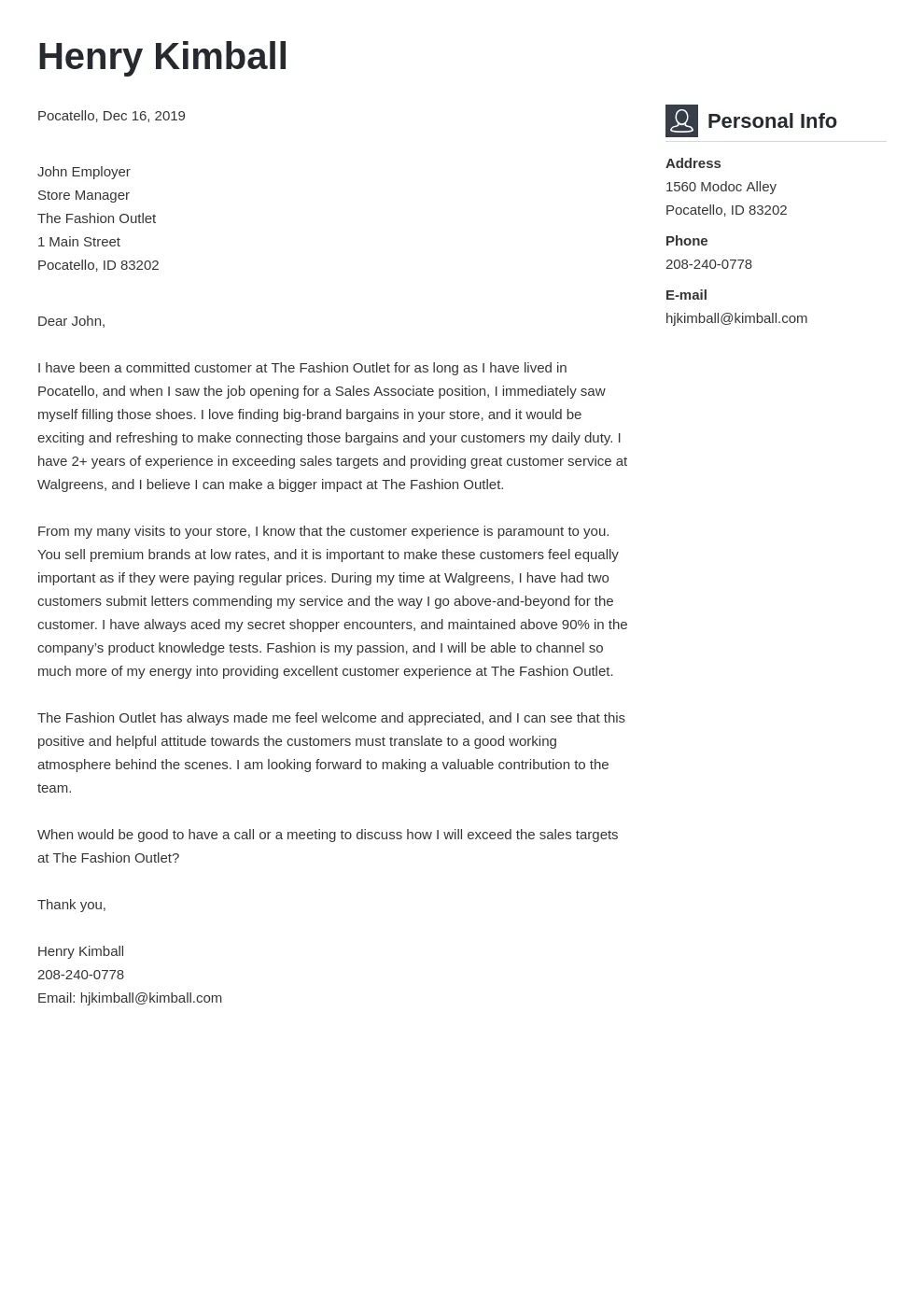
Express your enthusiasm for the role and the company. Sales associates need to be passionate, and this should come across in your cover letter. Clearly state why you are interested in the position and what you like about the company. Show your excitement about the prospect of contributing to their success. Enthusiasm can be contagious. It makes you more appealing to hiring managers. It also demonstrates your proactive and positive attitude, which is crucial for success in sales. Express your eagerness to learn and grow within the company.
Reviewing and Proofreading
Before submitting your cover letter, take the time to review and proofread it carefully. Ensure your letter is free of grammatical errors, typos, and inconsistencies. A polished cover letter reflects your attention to detail and professionalism, which are vital in a sales role. Having a second pair of eyes to review your letter is always a good idea. Mistakes can undermine your credibility. Proofreading is a final check that ensures the letter is ready for submission.
Checking for Errors
Thoroughly check your cover letter for errors in grammar, spelling, punctuation, and formatting. Even minor mistakes can create a negative impression. Use a spell checker and grammar checker, but don’t rely on them entirely. Read the letter aloud to catch any awkward phrasing or sentences. Look for any inconsistencies in the text, such as variations in fonts or spacing. Make sure that all the information you’ve included is accurate and up-to-date. Take your time, and ensure every detail is correct before submitting.
Ensuring Clarity and Conciseness
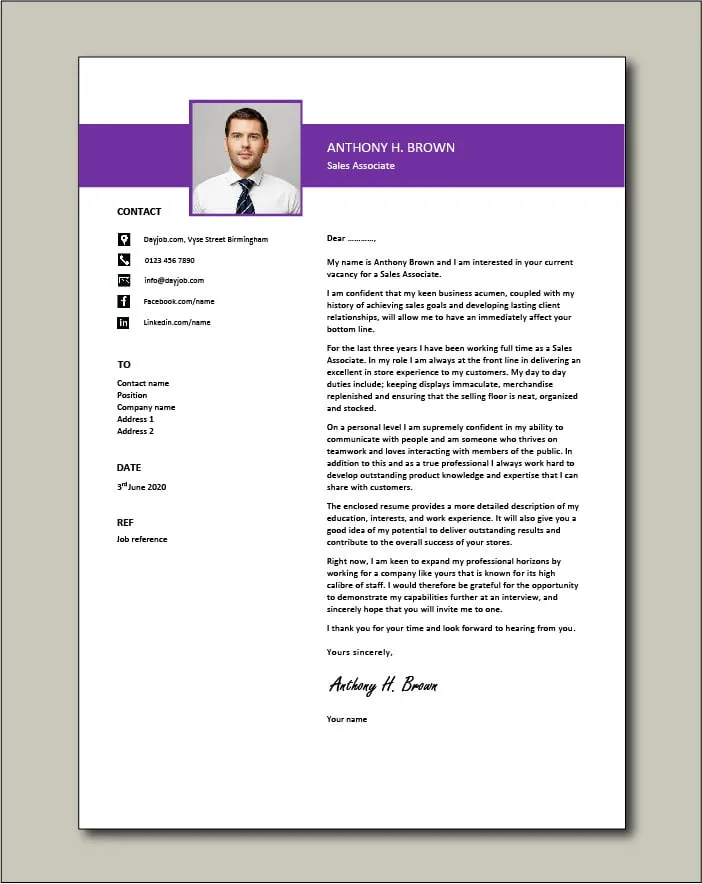
Make sure your cover letter is clear, concise, and easy to understand. Avoid using overly complex language or jargon. Use short, direct sentences and paragraphs. Keep your letter within one page. Get to the point quickly, highlighting the most relevant information. Make every word count, and focus on communicating your key qualifications and enthusiasm effectively. Clarity and conciseness show respect for the reader’s time and ensure that your message is easily understood.
In conclusion, writing a strong cover letter for a Sales Associate position involves highlighting your skills, quantifying your achievements, and tailoring your letter to the specific job and company. Focus on your sales experience, use action verbs, and demonstrate your enthusiasm. Always proofread for errors, and ensure your letter is clear, concise, and professional. By following these secrets, you’ll significantly improve your chances of landing the job. Good luck!
